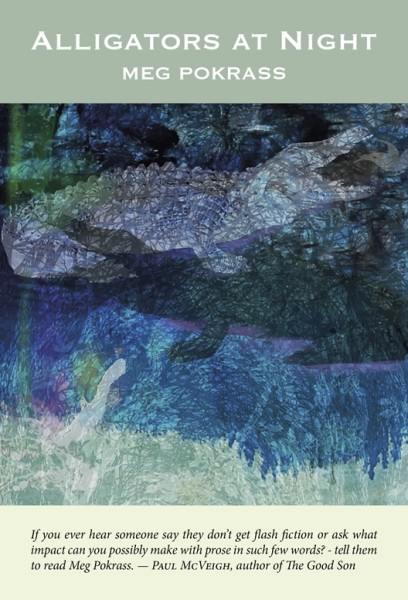
by Julia Tagliere
Brad Watson (author of Aliens in the Prime of Their Lives) dubbed Pokrass the “new monarch of the delightful and enigmatic tiny kingdom of micro- and flash fiction.” Incredibly prolific, Pokrass has written four previous collections and a book of prose poetry. Her stories and poems have appeared or are forthcoming in more than 300 publications.
Alligators at Night, published in July 2018, is Pokrass’ fifth collection. Comprising 72 pieces, many of which first appeared in publications such as Atticus Review, Necessary Fiction, and Jellyfish Review, this fascinating collection does not present an easily discernible underlying thread, at least in terms of subject matter. There are dead or dying pets (“You and Your Middle-Aged Cat”; “Being Sheila”); aging women (“Invisible”); old divorces and new beginnings (“Therapy Cat”; “Why Not Now”; “Starting Over”). Many of the pieces do, however, share a unique emotional theme: loss—not past loss or current, but rather, anticipated.
In the title piece, for example, the narrator and her husband are walking at night, listening to the “sound of alligators crooning like deranged, nocturnal cows” when she observes, “…what you sometimes want is to never actually get there. He has not yet had his dose of whiskey…You have not yet said you have a migraine, and that you don’t really feel like snuggling…You have not yet cried or threatened to leave…” Or in “The Benefits of Krill,” when the narrator tells her favorite cashier at the market by her pharmacy job that “Duncan has lung cancer and that soon the pharmacy will be gone. I need to become more memorable to him, and soon…” Four words is all it takes in “Separation”: “After packing, I find myself staring at his penis…It is friendly-looking. I will miss it.” These are all futures that have not yet come to pass within Pokrass’ narratives, but that wound nonetheless with their very inevitability.
Just as David Gaffney writes in “Stories in Your Pocket: How to Write Flash Fiction,” reading Alligators at Night feels like you’ve “been run over by a lorry full of fridges,” but in the very best of ways. Each precision-crafted story strikes an emotional chord and hits it hard, hammering away at different feelings so that it is difficult to read more than a handful at a time. I found myself needing to take frequent breaks to reflect on and process what a particular piece made me feel—and feel, I did.
Take, for example, “Dismount,” where a little girl beams a smile at her father, visiting her unexpectedly outside of his arranged time, a smile so enthusiastic she dribbles saliva: “…she walked out into the sunlight holding his big-fingers with no fear.” There is, of course, a subtle darkness mingling with the girl’s joy at his appearance—his displeasure at her dribbling, the “darkish stairwell,” her freckles “landing like buzzards around her nose”—but as I read it, all I can feel is her joy: “She was his princess on Sundays.”
Pokrass swings deftly between swells of joy like this to floods of darker emotion, as in her poignant “Man Against Nature.” She sets the reader up with a cozy scene of a couple watching a nature-survival show on TV, fragrant soup cooking in the background, only to slo-mo gut punch the reader with her last few lines, revealing the stark, painful contrast between the couple’s reality and the reality they’re watching on TV.
It’s not all darkness, however—far from it. Pokrass certainly excels at emotional wallops, but she also possesses terrific humor. She reveals this mainly through her characters, who make me snort out loud at something one or the other of them says. From “Albino”: “We went to a thrift store and joked about trying on hats and getting lice. ‘Miami Lice,’ he said.” Or the little girl idolizing her older sister, in “Playing the Chicken”: “I love it when she says fuck. She says it often and I like to sing it in my head. Last year, I was kicked out of girl scouts for saying that perfect word.”
Part of Pokrass’ talent in wrenching such intense emotions from her reader comes from the vividness of her descriptions. She has a brutally clear, unsparing way of forcing readers’ eyes wide open, insisting they see what she wants them to see. A few of my favorite examples: “I’d gotten so used to Mike’s nudity that I’d stopped noticing his penis crouched like a worried squirrel.” (“Wouldn’t You Like Some Sun?”) Or the woman friend “of a certain age” at lunch in “Invisible,” of whom Pokrass writes this: “Looking at her meaty arms, I thought of pie-crust dough.” From “You Are Better Than This”: “Like a drunk car on the highway, her lips followed the road of his hair. She could taste the salt of a tidal basin.” Pokrass hits all the senses with her descriptions—which only deepens the reader’s visceral emotional responses.
In the interest of full disclosure, I must confess I’m a recent convert to reading flash fiction, but this potent collection has completely won me over with its complexity, intensity, and gratification. Veteran flash readers and fans of Pokrass will certainly not be disappointed by Alligators at Night; newcomers to the genre, like me, will find an outstanding way to get acquainted.
Alligators at Night is available from Ad Hoc Fiction.
____________________________
Julia Tagliere is a writer and editor whose work has appeared in The Writer, The Bookends Review, Potomac Review, numerous anthologies, and the juried photography and prose collection Love + Lust. Winner of the 2015 William Faulkner Literary Competition for Best Short Story and the 2017 Writers Center Undiscovered Voices Fellowship, Julia currently resides in Maryland with her family, where she recently completed her M.A. in Writing at John Hopkins University. She serves as an editor with The Baltimore Review and is currently working on her next novel, The Day the Music Didn’t Die.


 Try SmokeLong Fitness for two months!
Try SmokeLong Fitness for two months!